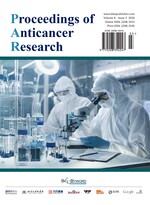Abstract
Objective: To study the expression of CMTM6 in colorectal cancer tissues and explore its relationship with tumor stage, lymph node metastasis, and prognosis. Methods: All patients underwent surgical resection and histopathological examination, and the collected tissue specimens were pathologically classified and divided into 41 cases in the cancer group and 75 cases in the paracancerous group to observe and analyze the expression of CMTM6 and PD-L1. Results: There was no statistically significant difference in the comparison of gender, age, disease duration, and other data between the two groups (P > 0.05); the high expression rate of CMTM6 in the tissues of the cancer group and the 2 groups of the paracarcinoma group was 82.93% and 1.33%, respectively, with statistically significant differences (P < 0.05), and the high expression rate of PD-L1 in the tissues of the cancer group and the 2 groups of the paracarcinoma group were 85.37% and 8.00%, respectively, with statistically significant differences (P < 0.05). The relationship between high expression of CMTM6 and PD-L1 and tumor diameter, differentiation degree, distant metastasis, and lymphatic metastasis was not statistically significant when compared between groups (P > 0.05). Conclusion: CMTM6 and PD-L1 are one of the factors predicting poor prognosis of colorectal cancer, and can be used as one of the reference indexes for treatment selection of colorectal cancer patients.
References
Lu ZM, Shang XQ, 2024, Expression and Clinical Significance of CMTM6 and PD-L1 in Colorectal Cancer. Chemistry of Life, 44(1): 83–88.
Dong X, Chen F, Zhang Y, 2023, Expression of PD-L1 and MSH2 Proteins in Colorectal Cancer Tissues and Its Correlation with Patients’ Prognosis. Chinese Journal of Anorectal Diseases, 43(8): 10–13.
Zhou J, Huang L, Rui K, et al., 2023, Analysis of the Expression Levels and Clinical Significance of Soluble Co-Stimulatory Molecules sPD-L1, sB7-H3, and sB7-H4 in the Serum of Colorectal Cancer Patients. International Journal of Laboratory Medicine, 44(15): 1853–1857.
Chen S, Mao Z, Zhang Y, et al., 2023, A Preliminary Study on the Expression and Significance of PD-L1 in Human Colorectal Cancer Tissues. Modern Immunology, 43(4): 307–311.
Ma W, Ren J, Chang S, et al., 2023, Correlation of PD-L1 Expression in Colorectal Cancer Tumor Cells and Tumor-Infiltrating Immune Cells with Clinicopathological Features and Prognosis. Modern Oncology Medicine, 31(14): 2660–2665.
Zhang Y, Han G, Cao Y, et al., 2023, Exploring the Effect of Kidney Tonifying and Detoxifying Knot-Dissolving Formula on the Immune Microenvironment of Advanced Colorectal Cancer Patients Based on PD-1/PD-L1 Pathway. Practical Medicine and Clinic, 26(4): 306–310.
Chen T, Zhou Y, Yan S, et al., 2023, PD-1/PD-L1 and Tumor-Associated Macrophages in Colorectal Cancer. Journal of Gastroenterology and Hepatology, 32(3): 328–332.
He Q, Yu B, Song Q, 2023, Effect of Antimicrobial Drugs on the Prognosis of Colorectal Cancer Patients Treated with PD-1/PD-L1 Inhibitors. Gastroenterology, 28(2): 76–81.
Dong ZY, Wang CH, 2023, Analysis of the Predictive Role of Inflammatory Markers on the Effect of Anti-PD-L1 Immunotherapy in Patients with Postoperative Metastasis of Colorectal Cancer. Chinese Journal of Integrative Medicine and Digestion, 31(1): 56–60.
Xu D, Yang HJ, Chen T, 2022, Expression of CMTM-6 in Colorectal Cancer Tissues. Zhejiang Practical Medicine, 27(6): 516–518.
